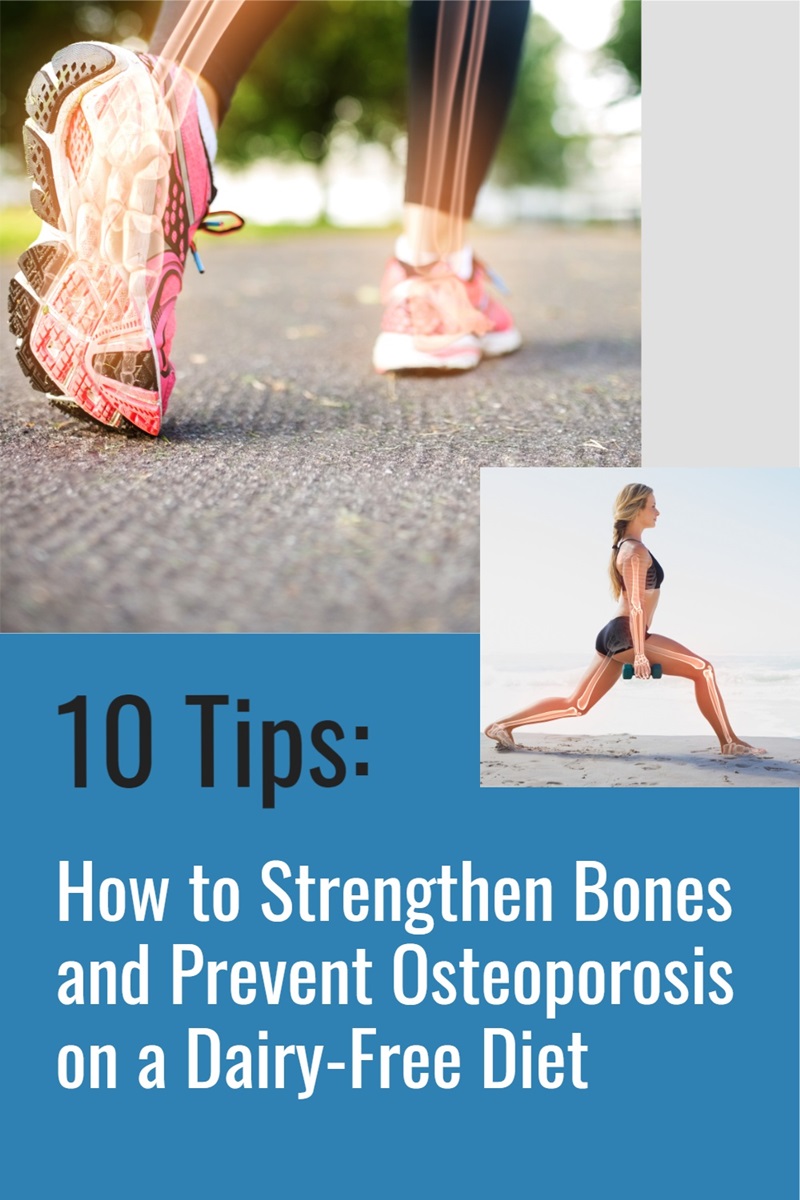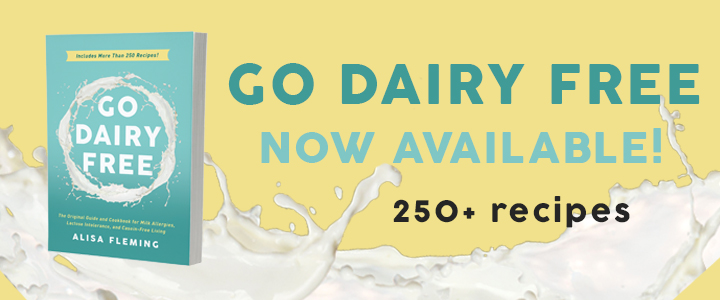When it comes to bone health, calcium is almost always at the center of discussions. We do need some calcium, which is why I’ve created an entire section on Dairy-Free Calcium. But it isn’t as simple as “eat calcium, deposit on bones.” In fact, calcium is pretty useless on its own. It requires other vitamins, minerals, physical reactions, and even healthy hormones to find its place. Our bodies are actually quite complex. Which is why the following tips are recommended by doctors and scientists to help build strong bones, prevent osteoporosis, and stave off fractures, whether you follow a dairy-free diet or not!

10 Dairy-Free Tips to Strengthen Bones and Prevent Osteoporosis
It’s never too early or too late to start thinking outside of the milk carton for bone health. Studies have shown that healthy habits in childhood can help prevent fractures as we age. And making changes in adulthood can still slow, and in some cases reverse bone loss. The following includes top research-based recommendations for building strong bones and preventing osteoporosis and fractures.
The following is for informational purposes only and should not be construed as medical advice. Always speak with your physician before undergoing any change in diet or lifestyle.
Exercise Regularly and Take Pleasure in a Range of Activities
There are no shortages of studies linking exercise to bone health at all ages. Weight bearing exercises, like walking, hiking, jogging, tennis, and dancing, along with strength training, have been shown to have a positive effect on bone mineral density. And many scientists believe the benefits are even more pronounced when exercise is started at a young age.
Beyond bone mineral density, fitness can also help to prevent fractures throughout our lives. Balance, flexibility, and muscle strength that’s gained from various types of activities, including yoga, bike riding, and swimming, can help to prevent injuries that might lead to fractures.
Get Enough Vitamin D
Vitamin D is crucial for calcium absorption, whether you are still growing or in maintenance mode. It isn’t naturally abundant in foods, but you will find it in many fortified products (yes, the vitamin D in dairy milk is fortification!). Fortunately, sunshine provides an abundant supply of vitamin D, and for gloomy days, supplements are available. For more information, see our Vitamin D Guide for Dairy-Free Living.
Enjoy a Balanced Diet
Bone health and osteoporosis prevention is a team effort. Calcium needs the support of various other vitamins and minerals to get the job done. I mentioned vitamin D in more detail above, but magnesium, potassium, fluoride, iron, zinc, copper, vitamin K, vitamin C, and vitamin E also play key roles in building and maintaining healthy bones. See the following post for more details: How to Get All the Nutrients in Milk on a Dairy-Free Diet.
Eat Your Greens, Including Spinach and Swiss Chard
A lot of websites villainize greens like spinach and swiss chard as “bad for your bones” due to their higher level of oxalates. Yes, the oxalates in spinach bind to the calcium in spinach, making it less bioavailable. But the oxalates don’t rob calcium from other foods or your body. And the greens still provide a modest amount of absorbable calcium. Plus, spinach and swiss chard are vitamin K rock stars. Leafy greens, like spinach and swiss chard, also boast good doses of vitamins A, C, and E, magnesium, and potassium. If you still want more absorbable calcium, turn to kale, broccoli, bok choy, and mustard greens.
Sip on Citrus
Several studies out of Texas A&M University have cited citrus as a potential key to osteoporosis prevention. Their results showed a marked improvement in bone density with the consumption of grapefruit and orange juice, and other research has concurred that citrus seems to improve calcium absorption. You can enjoy it by the glass, or use it in some Dairy-Free Orange Juice Recipes (there are 25 of them at the bottom of that article!).
Snack on Prunes
In studies led by Professor Bahram H. Arjmandi, chairman of the Department of Nutrition, Food and Exercise Sciences at Florida State University, dried plums (aka prunes) have shown an “exceptional” ability to improve bone mineral density in post menopausal women. His studies are ongoing for other demographics, but thus far, he has found that 10 to 12 prunes daily can exert notable bone-protecting effects. Beyond snacking, you can blend them into dairy-free hot chocolate or smoothies (I love them with almond milk, a frozen banana, and cinnamon) or use prune puree as a butter substitute!
Limit Alcohol
Research shows that heavy alcohol use, especially during developmental young adult years, can dramatically affect bone health and increase the risk of osteoporosis later in life. Alcohol is believed to weaken your bones by reducing the body’s ability to build new bone and replace normal losses. Of course, water is best, but if you must indulge, make sure you have no more than 1 or 2 servings of beer, wine, or liquor per day.
Get Your Hormones Checked
The primary reason osteoporosis risk increases as we age is due to the natural decline in hormones, like estrogen and testosterone. But several different hormones play key roles in bone formation throughout our lives. Imbalances, even with thyroid hormones, can negatively impact bone health at any age. Doctors often check hormones to ensure they are in optimal ranges, and might prescribe hormone replacement therapy to people who are deficient or who are at high risk for bone fractures.
Don’t Smoke!
As if we needed one more excuse not to light up! Several studies have shown that heavy smoking can lead to a higher incidence of bone fractures and lower bone density. And in at least one study, cannabis users faired even worse than tobacco smokers.
Discuss Medications with Your Doctor
Several medications have been indicated as potential contributors to bone loss and fractures. They include steroids like cortisone and prednisone, antacids that contain aluminum, protein pump inhibitors for GERD and ulcers, Heparin to prevent blood clots, and various other products. Be sure to weigh the risks of medications with your doctor. In some cases, such as epilepsy and cancer treatment, the bone loss risk might be worth taking. But in certain situations, your doctor might prefer to prescribe a different treatment.
Sodium and Sugar are Still Controversial
These two white crystals are constantly finger pointing at one another for increasing calcium excretion and bone loss. But newer research shows a low salt diet isn’t needed for preventing osteoporosis, an in some cases, sodium might even encourage stronger bones. Consequently, some medical professionals believe sugar consumption, not salt, is a much bigger issue for bone loss. But bone health studies have shown a mixed bag of results with both fructose and sucrose consumption.


17 Comments
Pingback: Pink Cadillac All Fruit Smoothie Recipe (Dairy-free & Vegan)
Pingback: Dairy-Free Benefits: Top 10 Reasons People Go Dairy Free
Pingback: Candida Diet, Vegan Gluten-Free, Sugar-free , Cashew Bircher Muesli Recipe for So Delicious | Ricki Heller
Pingback: 12 Top Dairy-Free Recipes for Healthier Indulgence
Great post! I’m not 100% dairy free, as I do have the occasional cheese, but I don’t drink milk. And I don’t eat meat, so I get the double “how do you get enough calcium/protein” questions ALL of the time!
Pingback: Fresh Pineapple Sherbet with Curry Cashew Crunch
Pingback: Vanilla Iced Coffee | no-dairy no-soy recipe | ShockinglyDelicious.com
Such a great post and so much helpful information! When I was vegetarian, I often received the same response – how do you get enough protein?! Same with calcium. There’s so much more than just one or two ways to get a nutrient.
Vitamin D deficiency is such a problem in NH due to the lack of sun. I try to take in Calcium and get vitamin D in many different ways. This is a very informative and helpful post (althouh, not sure about prune shakes, haha)
Seriously, I’m not a prune fanatic by any means, but prune shakes are surprisingly tasty! They go well with berries, chocolate or spices.
Always dairy-free! So many great recipes here too! You do not need dairy to get your calcium!
I love your attitude Rebecca!
What a great post! So many people just assume calcium=milk just because we’ve been bombarded with that for years.
Great read! Being Paleo I agree with so much of this. I think people oversimplify and just think- I need more calcium, drink milk, done. But there’s much more to it.
Thanks Kerri!
Thank you for such a thorough and well-researched article, Alisa. This is important information to have.
Pingback: Top 12 Dairy-Free Tips: How to Successfully Make the Switch